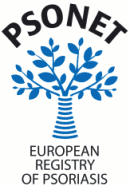Psonet
Glossary
- Psoriasis:
is a cutaneous disease characterised in the most common variety, i.e., chronic plaque psoriasis, by erythematous and scaling well demarcated plaques on the extensor body surfaces and scalp. - Psoriatic arthritis:
a peculiar arthritis associated with psoriasis. - Conventional treatments:
the term "conventional treatment" is usually employed as opposed to "biological agents". It refers to a number of treatments well established for the control of the clinical manifestations of psoriasis and include ciclosporin, methotrexate, acitretin, and ultraviolet-based treatments (phototherapy and photochemiotherapy). - Biological agents:
are those treatment which are derived from living cells through genetic engineering techniques. The currently available treatments include: tumor necrosis factor alpha antagonists, i.e., etanercept, infliximab, and molecules which modulate T cell functions, i.e., alefacept and efalizumab.
Moreover, the establishment of durable connections within a multidisciplinary group of European investigators sharing resources and activities may enable the nesting of biological studies within an epidemiological framework and the mounting of independent pragmatic randomised clinical trials to assess the advantages of different treatment strategies. - Pharmacoepidemiology:
the study of the utilization and effects of drugs in populations. To accomplish this study, pharmacoepidemiology borrows from both pharmacology and epidemiology.
